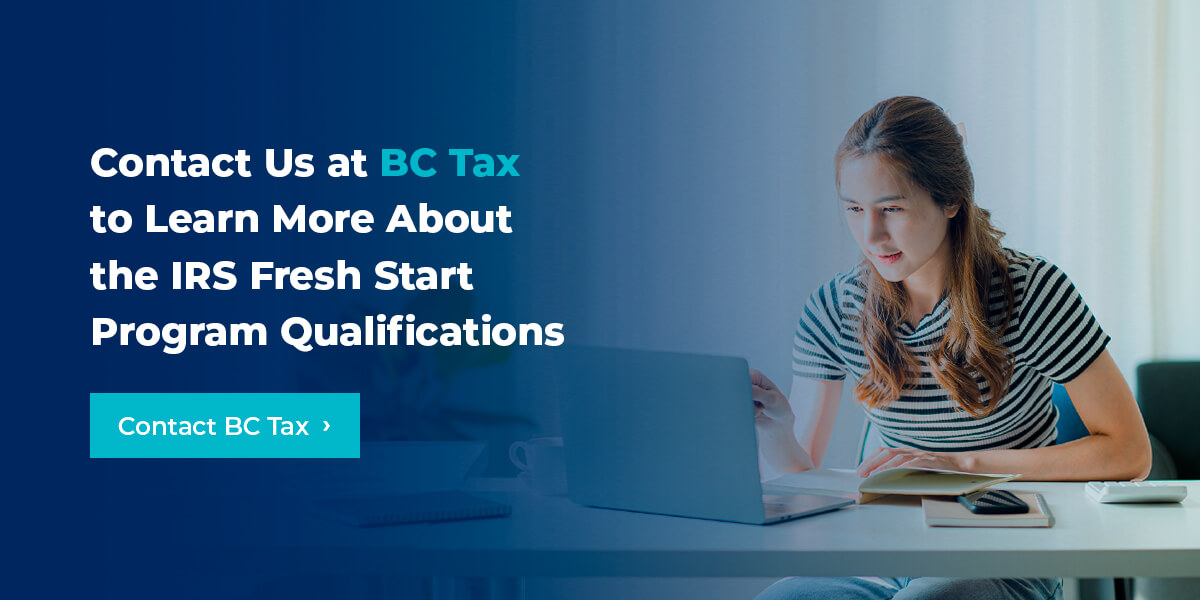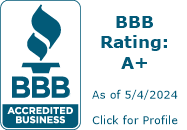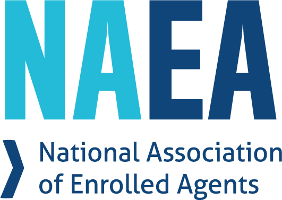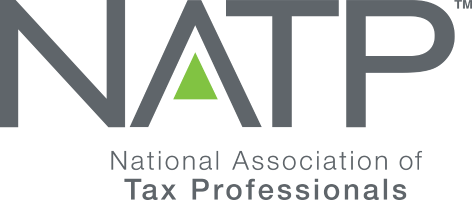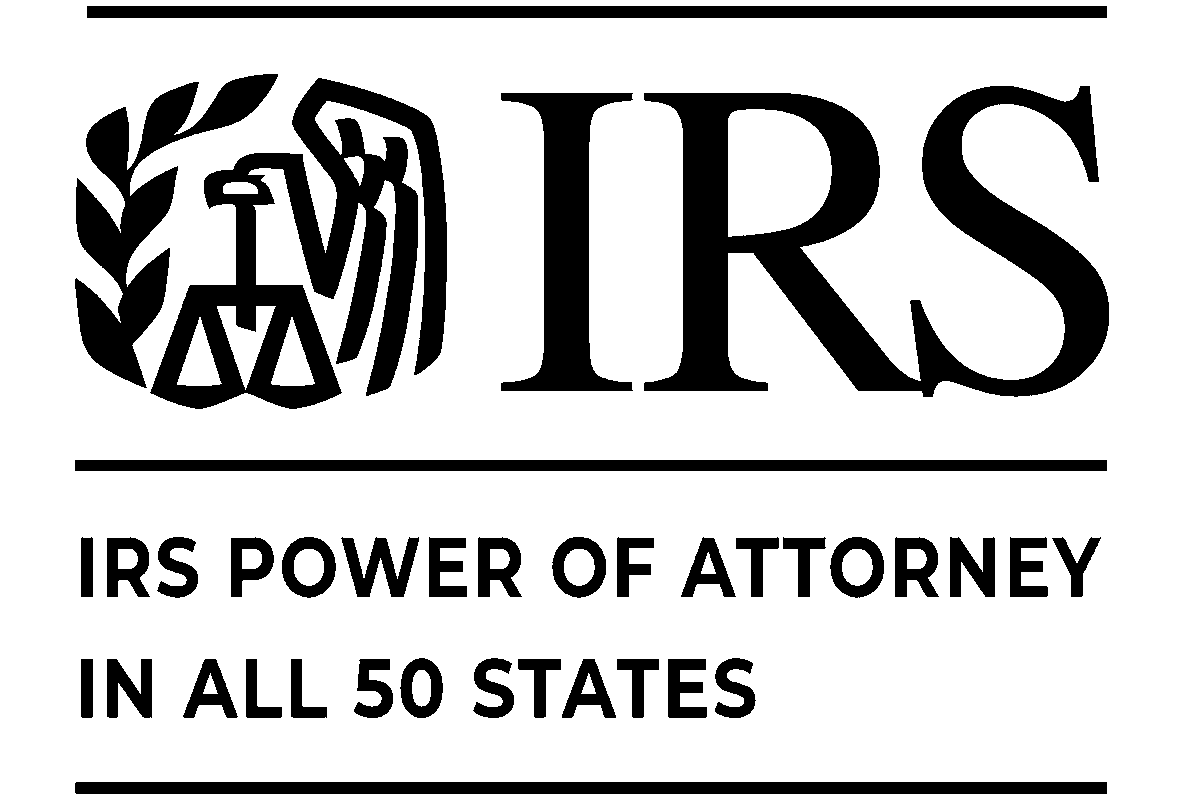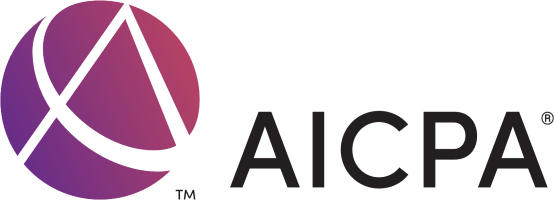The Internal Revenue Service (IRS) offers initiatives to assist taxpayers when they owe back taxes. With a tax relief program, the IRS may lower your tax bill or make it easier for you to pay the taxes you owe. If you qualify for the IRS Fresh Start program, you may be able to avoid major tax penalties and liens. By offering this program, the IRS can collect some of the taxes owed.
If you owe back taxes to the IRS and you’re looking for assistance, we cover more about the IRS Fresh Start program and whether you may qualify.
What Is the IRS Fresh Start Program?
The IRS Fresh Start program is a series of initiatives launched in 2011 to assist taxpayers who are having difficulty paying their taxes. The program aims to make it easier for taxpayers to pay back taxes owed by offering more flexible payment options and reducing penalties. The program has four main components:
- Installment agreement
- Offer in compromise (OIC)
- Currently non-collectible status (CNC)
- Penalty and tax lien relief
To participate in the Fresh Start Program, you must be up to date with all your tax filings and payments, including estimated tax payments for the current year. Remember that interest will also continue to accrue on any unpaid taxes, even if you are enrolled in an installment agreement or an OIC. The amount you may pay depends on the value of your liquid assets and your current annual income.
If you’re having trouble paying your taxes, you may want to consider exploring the options available under the Fresh Start program or consulting with a tax professional at BC Tax for guidance.
To apply for this program, we will follow these basic steps:
- Determine whether you are eligible.
- Gather your relevant financial information.
- Contact the IRS.
- Submit an application.
- Await a decision.
.Learn more about program options that may be available to you.
Who Qualifies for the IRS Fresh Start Program?
Whether you qualify can vary depending on whether you owe business back taxes as a business owner or personal back taxes as an individual. For example, as a single taxpayer, your income may need to be less than $100,000 to be eligible for the Fresh Start program.
While there are specific eligibility requirements for each component of the program, here are the general criteria for qualifying:
Installment Agreements
An installment agreement is when the IRS agrees to allow a taxpayer to pay their taxes owed to the IRS in smaller payments over time instead of in one large payment. Generally, any taxpayer who owes $100,000 or less in combined tax, penalties and interest and can pay the balance owed within a certain amount of time can qualify for an installment agreement with the IRS.
However, taxpayers must meet some conditions to qualify for an installment agreement. These conditions are:
- All tax returns must be filed: Before the IRS will consider an installment agreement, you must file all due tax returns. If you owe taxes for multiple years, you must file all the returns before you can set up an installment agreement.
- Ability to pay: You may need to demonstrate that you can pay the installment payments. This means that you should be able to make the required monthly payments without defaulting.
- No prior defaults: If you have defaulted on a previous installment agreement, you may not be eligible for a new agreement.
- Timely payment of current taxes: While making payments under an installment agreement, you must continue to file returns on time and pay all current taxes promptly.
- Approval by the IRS: The IRS must approve your request for an installment agreement. The IRS will generally review your financial information and determine the monthly payment amount based on your ability to pay.
Interest and penalties will continue to accrue on the unpaid balance until it is fully paid off, and there may be a fee to set up an installment agreement. Consult with a tax professional at BC Tax to determine the best course of action for your specific circumstances.
Offer in Compromise (OIC)
An OIC is when the IRS agrees to settle a taxpayer’s debt for less than the full amount. It is an option for taxpayers who are unable to pay their full tax debt, even under an installment agreement.
To be eligible, you must meet the following criteria:
- You must be current on all tax filings: You must have filed all required tax returns before applying for an OIC.
- You must have made all required estimated tax payments: If you are self-employed or have other income not subject to withholding, you must have completed all required estimated tax payments for the current year.
- You must show that you cannot pay the total owed: You must provide detailed financial information to the IRS, including your income, expenses, assets and debts, to show that you cannot pay the full amount owed, even with an installment plan.
- You must comply with all current tax obligations: While your OIC is being evaluated, you must continue to comply with all existing tax obligations, including filing all required tax returns and paying all current taxes.
The IRS is generally very selective when it comes to accepting OIC. They will only accept an offer if they believe it is the best option for the government and the taxpayer. If you do not meet the above criteria or the IRS believes you can pay the full amount owed, your offer may be rejected.
You may want to consult with a tax professional at BC Tax to determine if an OIC is the best course of action for your specific circumstances.
Penalty Relief
The IRS provides penalty relief to taxpayers who meet certain criteria. The following are some of the situations in which penalty relief may be available:
- Reasonable cause: If a taxpayer can demonstrate that they had reasonable cause for failing to file a tax return or pay taxes on time, they may be eligible for penalty relief. Reasonable cause may include circumstances beyond the taxpayer’s control, such as illness, natural disaster or death in the family.
- Administrative waivers: The IRS may waive penalties for taxpayers who demonstrate that they have made a good-faith effort to comply with tax laws but were unable to do so due to circumstances beyond their control. This may include situations where the taxpayer relied on incorrect information provided by the IRS or their tax preparer.
- First-time penalty abatement: The IRS may provide penalty relief to taxpayers who have a clean compliance history for the past few years and have not previously been assessed a penalty.
- Statutory exceptions: There are certain situations in which penalties are not assessed, such as when a taxpayer is a victim of identity theft or is in a federally declared disaster area.
Additionally, to participate in the Fresh Start Program, you may need to be up to date with all your tax filings and payments, including estimated tax payments for the current year. If you’re a self-employed business owner who wants to apply for this program, you may need to show a significant reduction in your business income.
Benefits of the IRS Fresh Start Program

The IRS Fresh Start program offers several benefits to eligible taxpayers, such as:
- Penalty relief: The Fresh Start program provides additional opportunities for you to request penalty relief for failing to file or pay taxes on time. This can be especially helpful if you are struggling financially and need extra time to pay your back taxes.
- Lower stress: Owing back taxes to the IRS can be stressful. By participating in the IRS Fresh Start program, you may be able to reduce the stress associated with owing money to the IRS and gain peace of mind that you can pay back what you owe.
- Reduced liens and levies: The Fresh Start program increased the threshold for tax liens and reduced the number of liens placed on taxpayers. Additionally, the IRS will generally not levy your wages or bank account if you are enrolled in an installment agreement or are negotiating an OIC.
- More flexible installment agreements: The Fresh Start program expanded the threshold for streamlined installment agreements, making it easier for taxpayers to qualify and reducing the amount of financial information required.
The Fresh Start program provides more options and flexibility for resolving your tax bill issues and avoiding costly penalties and collection actions by the IRS. Typically, the IRS Fresh Start program may be the right solution for you if you are struggling to pay your back taxes.
If the IRS believes it’s unlikely you can pay your taxes, they may approve you for an OIC or CNC status. If you think you can pay your back taxes but need more time, an installment agreement may be the right option for you.
Contact Us at BC Tax to Learn More About the IRS Fresh Start Program Qualifications
At BC Tax, we can help you find the right solution for your back taxes. Along with reducing tax liability, we’re dedicated to lowering your stress. Whether you need assistance with personal or business taxes, we can identify which tax relief solution is ideal for your specific circumstances. We can communicate with the IRS for you and ensure a smooth process.
Though we operate in Colorado, we serve taxpayers all over the country. Contact us at BC Tax to learn more about IRS debt forgiveness program qualifications.

 1-800-548-4639
1-800-548-4639